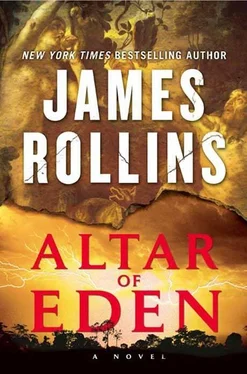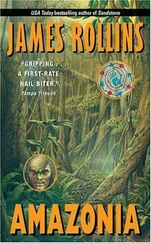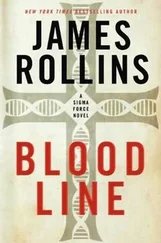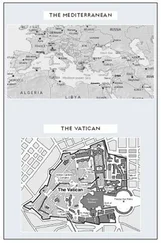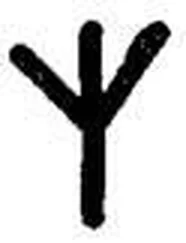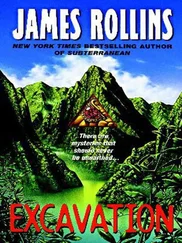Randy finally sagged. “Mais oui! All right! I heard you!”
Jack let him go and glanced to Lorna in the same apologetic way as the hounddog. The brother returned to his friends. The trio retreated to the far side of the canoes. Once Jack finished with orders for his second-in-command, he joined Lorna.
“Sorry about that. C’mon. Before you cause any more trouble, let me show you the layout for tonight’s search. See if you can offer any advice. That’s why you’re here, isn’t it?”
She rankled a bit at his surliness, but she kept her mouth shut. She followed him toward the pilot’s cabin of the boat. As he held the door for her, she was surprised to discover that the cabin was air-conditioned, almost chilly compared with the persistent heat of the evening. The sun had set, but the western sky still glowed a rosy orange.
He led her to a chart table. The only other occupant in the cabin was the ship’s pilot, dressed like all of Jack’s men in the CBP rough duty uniform, minus the helmet. The ship was already headed across Bay Lanaux. The trundle of the engine vibrated the deck through her hiking boots. The line of bayou forest stretched ahead of them, looking impenetrable and dark.
“Here’s the route we’re taking.” Jack placed a palm on a map clipped to the table. He ran a finger down a line drawn on the chart. “After the storm, we estimate the cat made landfall near Bay Joe Wise then headed due north.” His finger stopped. “Here is where we rescued the boy. That cat covered a lot of ground in a short time.”
Lorna had already heard the details about that fatal encounter. She took a deep breath, glad to fall back on her professional background.
“Jaguars hunt a wide territory,” she started. “That’s why she’s on the move. She’s genetically wired to keep moving until she finds a spot that she believes will support her.”
“So she could keep moving for a while?”
“Definitely. This migratory trait is one of the reasons jaguars are endangered in the wild. Their native jungles and forests are being encroached upon and broken apart by man. With this strong drive to roam, the breakup of their forests was driving them into deadly encounters with people.”
She had read about an environmental project was under way to create a continent-spanning chain of wild forests, linked from Mexico to South America, a vast landscape through which the jaguar populations could expand and migrate freely. It was called the Paseo de Jaguar, or Path of the Jaguar.
She studied the map, trying to figure out this particular jaguar’s paseo. There was one important clue.
“Let’s not forget that she also has a cub,” Lorna pressed. “So she’ll be looking for a territory with a rich food supply, rich enough for both of them.”
Jack kept to her shoulder, studying the map alongside her. “But where? If she continues north, she’ll be passing between Adam’s Bay and Lake Washington. That’s deep bayou country. Where do we even begin to search?”
“We start with her food supply. The bayous are the perfect environment for a jaguar. They typically hunt along waterways. In fact, a large part of their diet is seafood. Turtles, fish, caiman.”
Jack turned at her. “The kid we rescued said the cat had torn into a bunch of crab pots.”
She nodded. “Jaguars are opportunistic carnivores. They’ll eat anything. They can even bring down cows and full-grown horses.” She responded to the disbelief in his face. “They’re the perfect killing machine. Where tigers and lions rip out the throat of their prey, jaguars kill by crushing their prey’s skull. They have the strongest jaws of any large cat. Evolved, it’s believed, to help jaguars crack through the iron-hard shells of turtles.”
“If they like turtles, we’ve got plenty of ’em in the bayous. Terrapin, snapping turtles, and all manner of cooters and sliders.”
“Yes, but they’re small and less abundant than our jaguar will need. With her body mass, she’ll be looking for a dense and easily accessible food supply. She won’t stop until she finds it.”
Jack suddenly stiffened beside her.
“What?” she asked.
He leaned closer to the map and ran his finger along the hand-drawn line. He also searched to both sides of the path. His finger stopped and tapped. A name was written under there: Bayou Cook.
Jack straightened and glanced to her. “How sharp is a jaguar’s sense of smell?”
“Extremely sharp. They’re mostly nocturnal hunters, so they have to be able to track prey by scent.”
“How far do you think they could track a smell?”
“Hard to say. Depends on the source of the odor, its strength, the wind direction.” She shook her head. “Lots of variables. Could be many miles if the conditions were right.”
“So if a place gave off a really strong odor and the wind was in the right direction, it could draw the cat. Even from miles away.”
“Sure. But it would have to be a scent that the cat recognized as a food source.”
“You said jaguars fed not just on turtles and fish, but also on caiman. The southern cousin of the American alligator.”
“That’s right.”
“So if there was a concentrated source for such a meal, a place that really smelled strongly-”
“It would definitely draw her.”
Jack ripped the chart from the clips and carried it over to the boat’s pilot. He pointed. “This is where we’re headed. Bayou Cook. Radio the airboats, let them know there’s been a change in plans. We’ll head directly over there.”
“Yes, sir.”
Jack returned, the map in his hand.
“What’s at Bayou Cook?” Lorna asked.
“A tourist site. Draws sightseers year-round, mostly from the cruise ships that dock in New Orleans. You get a swamp tour, an airboat ride, and at the end, a visit to Bayou Cook.”
“What’s there?”
Jack stared hard at her, certainty in his eyes. “Uncle Joe’s Alligator Farm.”
Uncle Joe had no interest in children, but the camp groups brought in good money.
He stood on the front porch of his house with a tall, frosted bottle of Budweiser resting on the rail. The scorching day only seemed to grow hotter and damper as the sun faded away. It was like that out here. The first hour after sunset, the heat seemed reluctant to leave, overstaying its welcome. But slowly over the course of the night, it began to drain away, making it easier to breathe.
He enjoyed that time of night.
’Course, the beer helped, too.
He took a deep swig and stared across the thirty acres of his property. On the far side, a new campsite had been carved out of the neighboring stand of old-growth cypress forest. It was currently occupied by a troop of Boy Scouts from Baton Rouge, booked for the entire week. Campfires flickered among the tents, and strings of lanterns decorated the encampment. Songs echoed through the early evening, accompanied by the honking of bullfrogs and the occasional hoot from an owl or bellow from a bull alligator.
Between his log home and the campsite stretched the eight pools and pits of the alligator farm. He also had a bobcat exhibit and a shallow pond that held Gipper, a giant snapping turtle. The farm was crisscrossed with elevated walkways and observation decks.
He looked on with pride. It had cost him over half a million to expand the place from a single pond with a few breeding alligators to this singular attraction of the bayou. Last year alone, he had grossed three times his investment.
Of course, some of that money was under the table. As a conservator, he wasn’t supposed to sell the alligators for skin or meat, but it didn’t cost much to grease the palms of local enforcement agents to get them to look the other way. And for some wealthy anglers, newly hatched baby alligators were considered the best bait for bass fishing.
Читать дальше
